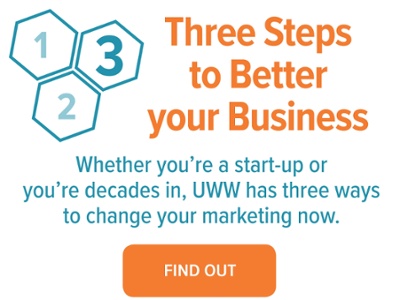
It’s not web traffic your measuring, it’s marketing results.
Here’s the question that inevitably flummoxes business owners: How much revenue is your current website bringing in?
It’s not uncommon for business owners to think of their website like their business card — static collateral — rather than what it should truly be: the cornerstone of all of your marketing efforts.
We start every website project with in-depth strategic planning that includes developing short-term and long-term business goals and defining the target marketing audience. Measuring website metrics — the number of people coming to the website, what pages they’re looking at, how many forms they’re filling out — allows us to find out what’s working and what’s not working.
Get to Know Your Audience
Gone are the days when you blasted your messages out to EVERYONE and hoped a few would respond. Consumers have a lot more choices in who they listen to, and marketers have the ability to address a smaller but much more sales-qualified audience. Here's what we ask new marketing clients:
- What are three types of customers that you need to attract to help you reach your goals?
- What are the demographic characteristics of your audience — age, gender, socioeconomic level, etc.
- What is a problem or need they have that you can solve?
- What are the obstacles they face in finding and buying what they want?
- What questions do they ask when you are selling to them?
Website analytics allows you to find out how visitors are finding your website, what pages they are reading the most and whether or not they are staying on your site for a meaningful amount of time.
Your site keywords will show which terms people are searching for on search engines. This is a great way to find out what people are actually looking for. Traffic sources will tell you where your site’s traffic is coming from — typically a mix of organic, referral and direct.
Bounce rate is the amount of time a visitor spends on your site. High bounce rates means you are getting initial clicks that you shouldn't. In other words, the wrong people are finding your website. It could also mean the right prospects are visiting, they just aren't seeing what they want, or what interests them.
Develop the Right Content
Once you know more about visitor behavior, focus your content on organic, helpful information that will produce leads.
Permission-based marketing is the outgrowth of the new reality presented by online interaction. Developing a list of visitors who opt in to a mailing list or other regular delivery of content greatly increases loyalty and trust levels.
This requires quality content. Invest time in planning an editorial calendar for your newly established audience. Do you want to publish a blog on an industry topic once a month? Once a week? Consider your production resources and set your goals. One great thing about written content is that it can be easily linked to offers, coupons and other information on your website.

Optimizing every page of your website for search is still vitally important. While your rank on a Google search return isn't the kingmaker it once was, it still is a tremendous help to appear on page one when a searcher types a key phrase in their browser.
And getting quality links to your site from other sites is like earning merit badges in the eyes of most search engines. It gives your site authority and visibility when others add your URL to their site. That's why Wikipedia appears at the top of most searches — because so many blogs, news articles, informative websites, emails, and other entities link to a Wikipedia article.
Do you know how your website measures up? United WebWorks can help you wherever you’re at with your marketing. Download our free marketing plan template. Fill it out to the best of your ability. Schedule a two-hour free consultation with our team. It’s that easy and there’s no obligation to buy anything else.
